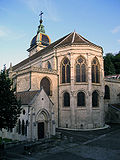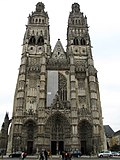The Catholic Church in France mainly comprises a Metropolitan Latin Church hierarchy, joint in a national episcopal conference, consisting of
Contents
- Current European French Dioceses
- Exempt, i.e. directly subject to the Holy See
- Episcopal Conference of ('Metropolitan', European) France
- Defunct jurisdictions in European France
- Titular sees
- Other defunct French sees
- Overseas French dioceses
- Exempt, directly subject to the Holy See (Africa)
- Episcopal Conference of the Antilles
- Episcopal Conference of the Pacific (Oceania)
- Gallery of Archdioceses
- See also
- Notes
- Sources and external links
- fifteen ecclesiastical provinces, each under a Metropolitan Archdiocese (15)
- with a total of 80 suffragans: seven non-Metropolitan Archdioceses, 72 bishoprics and a Territorial Prelature
- two exempt non-Metropolitan Archdioceses
- the (exempt) Military Ordinariate.
Furthermore, it has four exempt Eastern Catholic jurisdictions : three rite-specific (of which two are transnational) and a national Ordinariate for the Faithful of Eastern Rite for all others without rite-proper Ordinary.
The French overseas departments and territories, although administratively and constitutionally part of the French republic, are not part of the French church under canon law but exempt and/or part of an episcopal conference in their respective continent.
There is also an Apostolic Nunciature (as papal diplomatic representation at embassy-level) to France in the national capital Paris. the country also hosts three multilateral Holy See Representations: to the United Nations Educational, Scientific and Cultural Organization (UNESCO), to the Council of Europe in Strasburg and to the International Commission on Civil Status (ICCS).
The following contains the list of the French Catholic Roman Catholic dioceses of France as since 2002. See also the List of Ancien Régime dioceses of France and the List of French dioceses in the 19th and 20th century for information prior to 2002.

Pope John Paul II completely redrew the map of French ecclesiastical provinces in December 2002, in order to coincide more closely with the map of French administrative regions, but losing in several instances remaining boundaries surviving from late Roman times. This meant the creation of a few new Metropolitan archbishoprics and ecclesiastical provinces. This also entailed, for several archbishoprics, the loss of their metropolitan status (symbolised by the wearing of the pallium): their bishops nevertheless retained the title of archbishop.
As a result of history, many former episcopal sees were united, mainly as a consequence of the French Revolution; hence many dioceses bear the names of several cities, in which case, only the first one is the cathedral see where the bishop still actually resides.
In France, most dioceses coincide with a department of France, but there are a few exceptions, where some arrondissements are attached to a diocese outside the department, or form a separate diocese within the department (this happens mainly in departments with numerous populations, such as Nord or Bouches-du-Rhône). Along with the list of the new ecclesiastical provinces and their suffragan dioceses, this list also gives the equivalent of the diocesan jurisdiction in departmental terms.















